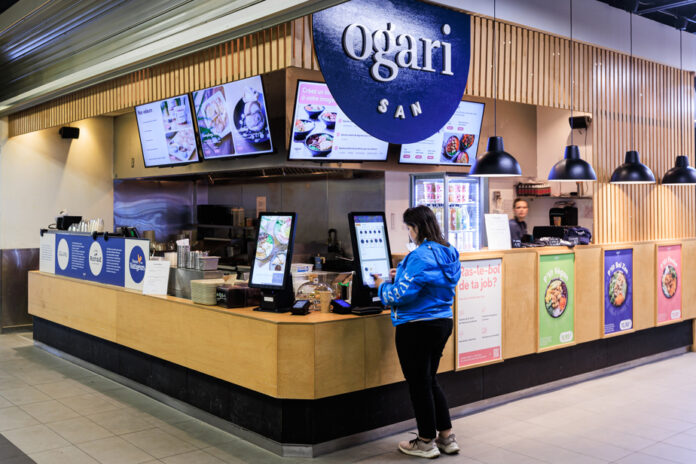Ban the cashier position. This is the action taken by David Trudeau-Fournier, co-owner of the Ogari San and Gaijin Ramen fast food counters, due to the labor shortage and also the lack of motivation of his employees to occupy this position , they preferring to be active in the kitchen.
The main person concerned himself describes his decision as “drastic”, but he would not go back.
Thus, customers who wish to eat at one of Mr. Trudeau-Fournier’s two food stations, located in the Pyramid of Sainte-Foy in Quebec – where a good number of restaurants and businesses are located – no longer do business with a human when the time comes to order and pay for their bowl of chicken, ramen or other dumplings, but rather at an interactive terminal which will take care of them until the cooks give them their meal.
Although many restaurants use the services of this type of technology, it is generally possible, for consumers who prefer, to place their order with an employee behind a cash register. Which is not the case at the two David Trudeau-Fournier counters.
“Everyone was unmotivated to checkout. There are people who didn’t want to stay [employed] for that reason, says the restaurateur on the line. It became difficult to recruit candidates because they [especially wanted] to cook. »
Result: by eliminating the cash register, fewer hands are needed and aspiring employees are more motivated to get hired. This decision, an investment of $15,000 to acquire three terminals, allows him to “save” the equivalent of 40 hours of work per week.
He was thus able to reduce his teams. Gaijin Ramen currently has 5 employees, while there are 12 working at Ogari San.
However, is there not a danger of losing human contact with the customer, a bond valued in catering? According to David Trudeau-Fournier, “it’s a myth that being a cashier allows you to have quality contact with customers.”
“[Now], it allows us to focus on the quality of the food. » Since the arrival of the terminals, a year ago at Gaijin Ramen and in February at Ogari, Mr. Trudeau-Fournier assures that few customers are resistant to the idea of paying and ordering using a machine. “What they don’t want is to be left behind if something goes wrong. » However, if there is a problem, an employee comes to the rescue.
In the event of a breakdown or problem with the machine, customers can order online using their phone. Note that the food court where the restaurant counters are located is very frequented by students who are rather open to these technologies.
Although he sees a certain trend in restaurants for a hybrid model (kiosk and cashier), Mr. Trudeau-Fournier does not believe that his decision to abolish cashier positions will snowball.
“I think there is a lot of enthusiasm for a mixed formula at the moment. For a formula as draconian as ours, I’m not sure,” he admits.
At the Association Restauration Québec (ARQ), vice-president of public affairs Martin Vézina describes this choice to abolish the funds as “very innovative”. It is difficult to know if David Trudeau-Fournier’s counters are the only ones in Quebec to operate solely with terminals, but according to Mr. Vézina, there are probably few of them.
“I believe that the restaurant industry is in a transition phase,” adds the Quebec restaurateur. There really was a cult of customer service, that it was the priority. There, I think customer service will become a lesser priority. Employees no longer accept being walked on for anything under the pretext that the customer is always right. I also believe that people’s priority will be elsewhere: knowing the origins of their food rather than having it served with a big smile. »















